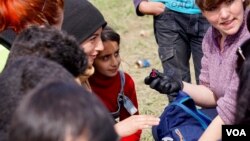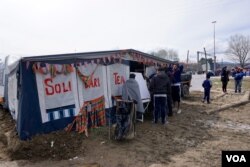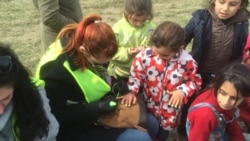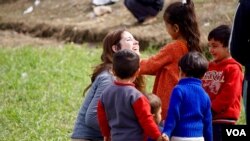Last summer, war refugees fleeing the Middle East started arriving in overwhelming numbers on the Greek islands after risking a perilous crossing of the Aegean Sea from nearby Turkey.
Some European vacationers dropped their holidays and started helping asylum-seekers. They were joined by hundreds of volunteers from across Europe. The refugees stuck on the Greek-Macedonia border have not had the same scale of support.
There are now an estimated 16,000 war refugees and migrants, most fleeing conflict in Syria and Iraq, trapped on Greece’s border with Macedonia. The Macedonians have shut the border at Idomeni and conditions are worsening here by the day.
Even so, there are far fewer volunteers at Idomeni to help the refugees than last summer when European vacationers switched from being holiday-makers and became informal relief workers. They were joined by hundreds of mainly young Europeans from across the continent moved by media coverage of the plight of the asylum-seekers.
Maybe fatigue has set in with the prolonged refugee crisis - there are only a handful of non-Greek independent volunteers at Idomeni.
Among them is a group calling itself SolidariTea, made up of independent volunteers who met last summer on the Greek islands. And they have brought with them a battered 50-year-old mobile tea-maker once used by the East German army to cater to troops on field exercises.
WATCH - Volunteers painting nails of refugees at Idomeni
Bringing back ‘humanity’
Jana Rickardt, a 23-year-old volunteer from Germany, explained that her group aims to bring a semblance of normalcy into the lives of refugees.
“We came down here to support refugees. We are from a group that drives down the Balkan route carrying donations and also this machine to make tea. We have transported food with us as well but the last days we are always giving out tea at night mainly because we think this creates a community. It is supposed to bring some humanity back to this place,” Rickardt said.
The group gets the refugees to help make the tea - dispatching some to gather firewood and others to fetch water.
Tea-making isn’t the only community-raising exercise the group of seven volunteers engages in. Two other female volunteers were busy painting the nails of some refugee children and women in garish colors, prompting laughter. Another two were helping refugee kids stitch together a banner. And yet another volunteer was dancing with some refugee children.
They believe part of the reason for the absence of large numbers of volunteers is that university classes are still sitting in European countries. Also, Idomeni is in a remote part of northern Greece with few hotels and facilities around. There are no trains or buses from the biggest city close by, Thessaloniki.
‘Raising awareness’
The group is critical of the established NGOs, accusing them of being hidebound and too bureaucratic.
Ellen Muriel, a 22-year-old British volunteer and student at the University of Exeter, said that for support the group heavily relies on social media.
“We basically set up like a ‘Go-fund-me’ page and a website and a Facebook page and just sent it out to all our friends and family with our objective and what we wanted to do and we pay the transport, we pay for ourselves, the food we pay for ourselves, so the donations are purely for what we distribute,” she said.
Muriel said it is inevitable that the big NGOs have to take on most of the burden but there is a wider point to what independent volunteers can contribute.
“It is about raising awareness back home through what we are doing, like we keep updated, we write blogs, we put up photos so people can see where their money is going,” Muriel said.
The group believes many more independent volunteers need to come.








